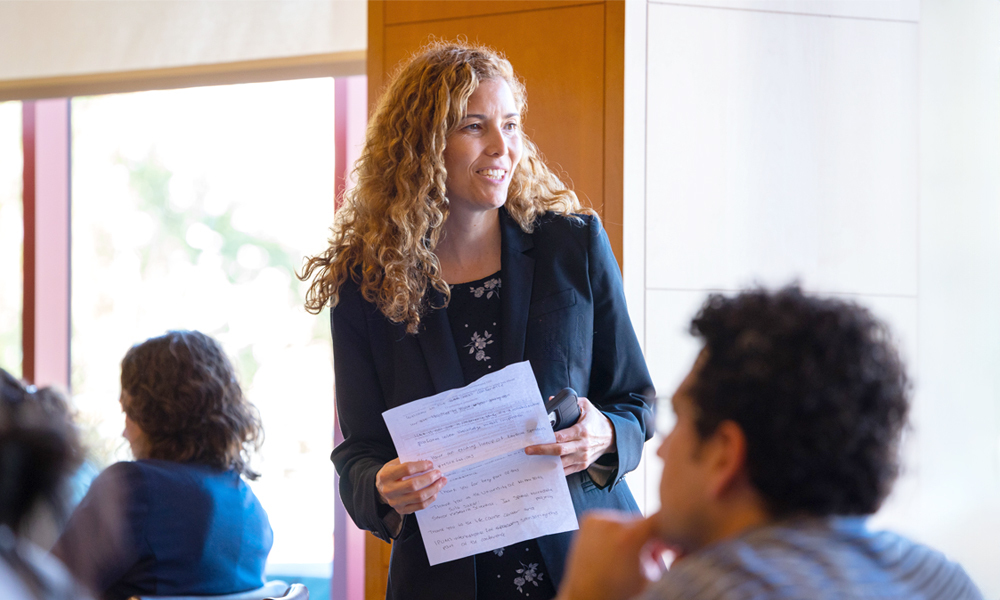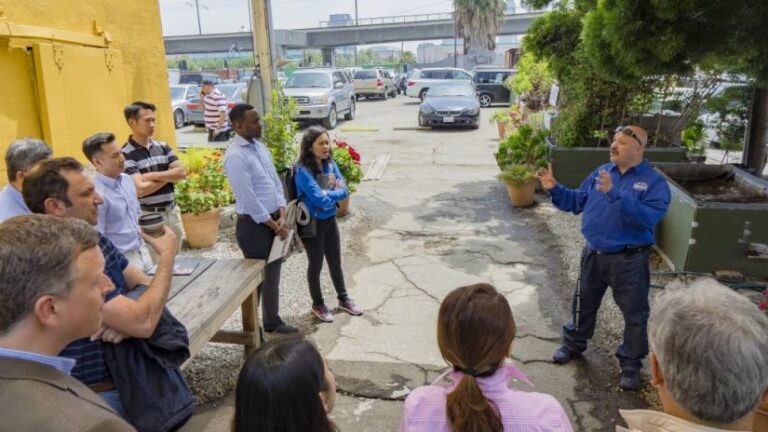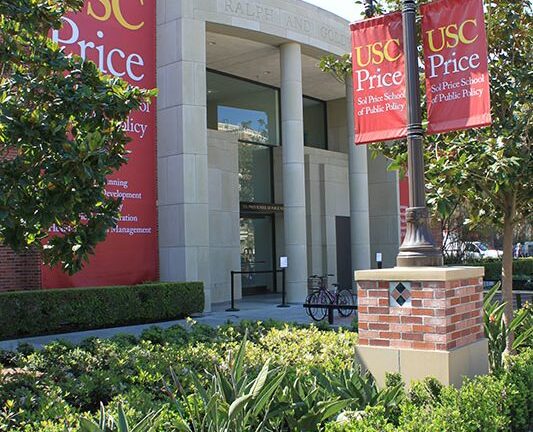
USC Price School Associate Professor Emma Aguila at the International Conference on Aging in the Americas. (Photo: Thomas Queally)
USC Price Professor Launches Hispanic Well-Being Initiative
USC Price School Associate Professor Emma Aguila is continuing her commitment to help people in need with the launch of the Hispanic Well-Being Initiative.
When Emma Aguila was 14, she’d take school trips to poor parts of Mexico to help teach and entertain children. During one of these trips – from her home in Mexico City to Cotija, Michoacan – Aguila and her friends stumbled upon a small hut. Inside were an infant, a 2-year-old and 5-year-old, all on their own and covered in dirt. Their mother, Aguila learned, had to work in a distant community, leaving the 5-year-old in charge.
The scene left Aguila, now an associate professor at the USC Sol Price School of Public Policy, feeling speechless and powerless. She and her friends helped as best they could, cleaning the hut and feeding the kids, but Aguila knew the children would be in the same circumstance the next day.
Since that moment, “I have felt a strong commitment to help people in need and to make a difference through my research,” Aguila said.
Aguila, an expert in aging and health economics, is continuing that commitment with the launch of the Hispanic Well-Being Initiative. The initiative will conduct research focused on Hispanics and Latinos to understand the social determinants of their health. USC Price School researchers will deploy a “life course approach” – meaning they’ll analyze individuals’ entire life histories to gain insights – and will examine the lives of people in both the United States and their country of origin.
“It’s important to have cross-country comparisons because it allows us to get a better picture,” Aguila said. “We’re able to observe the whole population and understand their health better.”
The Hispanic Well-Being Initiative recently organized its first event, the 16th International Conference on Aging in the Americas (ICAA). The three-day meeting, co-hosted by the USC Price School and the USC Leonard Davis School of Gerontology, took place at the start of Latine/x Heritage Month.
The conference focused on the health and aging of Mexican populations on both sides of the border. Roughly 120 people listened to research presentations on topics ranging from smoking habits and dementia to the health effects of climate change.
Such research is especially relevant in Los Angeles County, where nearly half of the population is Hispanic or Latino. Hispanics are also one of the fastest-growing demographic groups in the U.S., particularly among older adults, Aguila noted.
“Aging populations in Mexico and other countries like Mexico have undergone a very rapid demographic transition relative to the United States and countries like us. Their aging has happened faster,” said Eileen Crimmins, professor and the AARP Chair in Gerontology at USC Leonard Davis.
Some risk factors for health conditions that occur in old age, such as smoking tobacco, manifest differently in populations like those in Mexico compared to the U.S., Crimmins noted. A life-course approach to research could reveal how those differences may have contributed to inequities in health and aging.
“The whole idea of lifelong factors affecting aging makes it very possible that people who grew up in a highly infectious environment – with high infant mortality and poor living conditions – age differently from people who grew up in the rich environment of the United States,” Crimmins added.
Krissia Giron, a USC Price School student pursuing a Master of Public Policy, grew up in Mexico City and attended the ICAA conference to learn more about health challenges facing Hispanic Americans – and how those compare to what she experienced in her home country.
“Maybe the disparities that I’ve faced in my home country are very different here because you
have to deal with a whole different health care system, you have to learn a different language, and just the lifestyle here changes our culture,” Giron said.

The Hispanic Well-being Initiative builds on work Aguila and her colleague have done with the Mexican Health and Aging Study, a longitudinal study of older adults in Mexico. As part of that study, Aguila has already published research comparing safety net programs in the U.S. and Mexico, examining gender differences in cognitive function, and looking at the impacts of migration on aging, among other topics.
The goal of the new initiative is to develop and nurture research focused on social determinants of Latino and Hispanic health. Social determinants, which are non-medical factors that influence health outcomes, can include anything from education-level and job opportunities to economic policies and climate change.
“All of that affects your health,” Aguila said.



